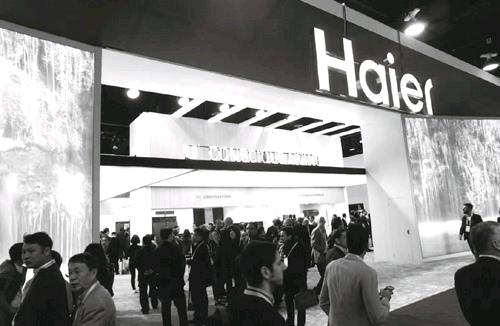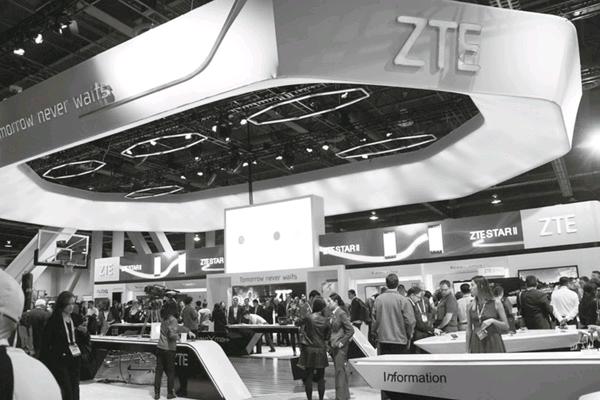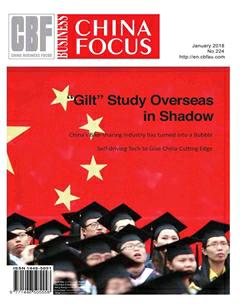CES 2018:Chinese companies step into spotlight
Chinese technology companies were in the limelight at this years Consumer Electronics Show in Las Vegas as more than 1,500 companies put their gadgets and innovations in the spotlight. With Chinese exhibitors second only to the United States roughly 1,600 companies at the CES, their new cooperations, products, and technology displays also came to the fore.
According to an earlier report by China Daily, Chinese participants are much more confident and much better at communication than before, said Joana Wei, an investor based in Palo Alto, California. Now lets catch some of their glittering moments at the event.
Baidu Inc
Chinas largest search engine, Baidu, used the Consumer Electronics Show in Las Vegas to announce an upgrade of its Apollo software. Internet giant Baidu Inc, the Beijing-based answer to Google, will join forces with US-based chipmaker Nvidia Corp and German automotive supplier ZF to create a production-ready AI autonomous vehicle system designed for China, said a news release on Jan 7.
The collaboration is based on the new Nvidia Drive Xavier, ZFs new ProAI car computer and Baidus open autonomous driving platform called Apollo, said Jensen Huang, founder and CEO of Nvidia, at the opening press conference of the CES 2018.
At the same time, Baidu Inc also announced its cooperation with Access Services, a US-based public paratransit services provider to launch a selfdriving pilot project in Los Angeles by the end of this year, while the company and Singapore technology conglomerate Asia Mobility Industries unveiled a joint venture and a newly established$200 million fund to promote the commercialization of Baidus autonomous driving technologies in Southeast Asia.
Huawei
“China wants to be the leader, not a follower in 5G,” Richard Yu, CEO of Huaweis consumer products division, said in a keynote address.”We were behind in 3G development, but we caught up with others in 4G and will be the global leader of the ICT (information and communications technology) industry in the era of 5G.”
For Huawei, 5G innovations made it into the keynote speech that launched the Mate 10 Pro smartphone, which features the worlds fastest “4.5G or pre- 5G experience”. 5G is the next frontier in mobile networks and wireless communications, and will feature faster data transfer
About 1,500 Chinese tech companies, including industry giants like Baidu and Alibaba as well as startups put their home-grown gadgets on display at the Consumer Electronics Show (CES), which kicked off Tuesday here. Holding one-third of all booths, Chinese tech companies are holding a dozen press conferences and have thrilled audiences with a keynote speech by Huawei to promote its latest smart phone.endprint

As the workshop of the world, China is not a newcomer to the consumer electronics industrys largest show, but the countrys manufacturers are becoming more innovative. Gary Shapiro, president of Consumer Technology Association, the shows organizer, cited in Tuesdays opening speech that 5G, artificial intelligence (AI) and robotics were underlying forces reshuffling the industrial landscape and bringing substantial lifestyle change. “The driving themes of 2018, including voice computing, artifi-cial intelligence and connectivity make our lives better and more efficient,”Shapiro said.
Chinese companies are not only embracing the “new ecosystem,” but also building it. Lu Qi, Baidus COO, called it “Chinas speed” in the companys CES debut press release. He pointed at the speed in which the driverless car could make a field test in China after a fleet of vehicles, including two sedans, a Lincoln SUV, and a motor sweeper, paraded at Baidus headquarters through a live stream at the conference.
Suning Group, one of the largest home appliances retailers in China, opened a self-service store in Las Vegas. The Nanjing-based retailer has already opened five such stores in China while no such store has ever been put into operation in the United States. “China has made a quicker start with many experimental programs,” Su Nings Executive Vice President Xiang Jiangxu said.
This years star is Byton, an electric car unveiled at CES known as Chinas Tesla. It is expected to be mass produced and sell at $45,000, making it a real competitor to Tesla. The new ecosystem has new players and many Chinese companies seized the opportunity to hit center stage. Iflytek Company is one of them. The company that specializes in AI translation made its debut at CES and showed its real-time Englishto-Chinese translation. It ran as good as a human translator.
“In past 18 years, about 160 million terminal devices uses iflyteks technol-ogy,” said Liu Qingfeng, the companys president. “Over 100 companies globally want to be partners with us.”Chinas startups have also found their niches. Horizon, a Beijing-based AI chip maker, is tapping the lucrative AI market with low-cost AI chips, tailored for specific purposes.
“The pure computing ability of our chips is no comparison to those made by NVIDIA or Intel, but the power consumption of our chips is rather low,” Zhou Feng, the companys chief designer said. “Thats our targeted market, and its big, especially in the building of smart cities.”endprint
Chinese innovation practices also attracted attention at the CES. A forum to introduce how Chinas manufacturers and retailers innovate and set the trend will be held during the show.
China has made headlines at this years CES, or Consumer Electronics Show-an annual trade show organized by the Consumer Technology Association, which officially started on Tuesday in Las Vegas, not only because the nation has sent more than 1,500 companies and once again is the top exhibitor.
The disruptive technologies and innovation that Chinese companies have demonstrated at the annual show are now seen as essential.Chinese exhibitors account for more than one-third of the total participants at the CES this year, which is a highly-valued platform through which Chinese products are introduced to the Western world.
Some startups this year, such as electric-vehicle manufacturer Byton, joined the long list of companies from China to unveil its first drivable model car at the CES. Chinese companies also are cutting a more distinctive and stronger presence by acquiring the center stages of the exhibition halls and convention venues and becoming used to the spotlight, where they can showcase their best and brightest ideas and products.
On Monday, Baidu held a largescale event featuring its newest AI tech-nologies, including autonomous driving platform Apollo and conversational artificial intelligence platform Duer-OS.
Lu Qi, Baidus vice-chairman, group president and COO, led the presentation by asserting that “AI is changing the world, China speed.” Liu Zihong, founder of Shenzhen-headquartered Royole, which had specialized in human-machine interface technologies and flexible displays since 2012, now operates a team of 1,600 members from 16 countries.
“Our research team owns a total of 1,600 intellectual property patents, and we emphasize the value of technology and innovation,” Liu said. In 2016, Royole introduced the worlds first curved car dashboard based on flexible electronics at CES. The companys flexible display mass production campus, which cost $1.7 billion, was completed in Shenzhen the same year. It completed series Pre-D funding in October 2016, with a market valuation of $3 billion, making it one of the worlds fastest- growing technology startups.
Unlike in previous years when many Chinese companies chose to stay in corner booths and were clumsy at marketing, more Chinese exhibitors are confident and know how to communicate with the outside world, said Joana Wei, a cross-border investor based in Palo Alto, California. “I told our team to pitch for the best spot at the exhibition hall and arrange a spacious display of products,” she said, referring to one of the Chinese companies she has fi-nanced, AntVR.endprint
“Our booth space is almost the same as Googles this year,” she said.“To me, this is another format of confidence and capacity display.” Chinas hi-tech hub Shenzhen continues its impressive participation at the CES consumer electronics trade show in Las Vegas, which lasts from Tuesday to Friday, and the south Chinese city name is part of nearly 500 participating companiesnames.
According to the Consumer Technology Association, the group that hosts the show, roughly 4,500 companies and organizations will attend this years event, ranging from well-known brands, such as TCL, Samsung and LG, to the startups.
Among these, CESs data show that about 1,551 are Chinese companies, accounting for more than one third of the total. The over-half-century-old annual gathering is a global stage for innovators to showcase their latest technologies, gadgets, car technology, etc. As for this year, those like artificial intelligence, smart home and vehicles, drones, robotics, virtual reality and augmented reality are the attractive spots at the CES.
The word “Shenzhen”, the city in South Chinas Guangdong province, was also associated with 652 Chinese companies last year in the mid of the total of 1,300 ones participating in the event, the Beijing New reported. However, the newspaper added that Chinese companies did not gain as much applaud even though nearly one third of participants were from China at that time, although Chinese-made drones were the exception.
“[Chinese] AI-powered firms will not let us down this year,” Liu Dingding, a Beijing-based industry analyst, told the Global Times on last Monday. He added that as some AI applications are now “just around the corner,” Chinese companies are likely to become leaders instead of followers in some domains such as speech recognition, computer vision and autonomous driving. In July, the State Council, Chinas cabinet, issued guidelines on AI development, and AI projects and other areas related to AI, such as big data, cloud computing,quantum computing, and brain science, have also been proposed.
The guideline set a goal for China to become a global innovation center in this field by 2030. The total output value of AI industry is expected to exceed 1 trillion yuan ($151.78 billion). AI has also quickly become the hottest area for Chinese start-ups, said a report by research consultancy Eurasia Group and VC firm Sinovation Ventures in December 2017. The report said that investors poured $4.5 billion into over 200 AI companies between 2012 and the third quarter of 2017.
For Chinas startups, they have experienced dramatic transformation over the past 10 years, from copycat versions of existing applications to true leapfrog innovation, it said. “Usually, Chinas small- and medium-sized enterprises make up a large part of CES participants. When big players join the event, they will increasingly make the presence of Chinese tech firms felt,” Wang Yanhui, head of the Shanghai-based Mobile China Alliance, told the Global Times.
As more Chinese companies seek their presence in the international market, they have to be fully aware of hurdles such as language barriers, different corporate management structures and tightened regulations, Liu said to the newspaper.endprint

